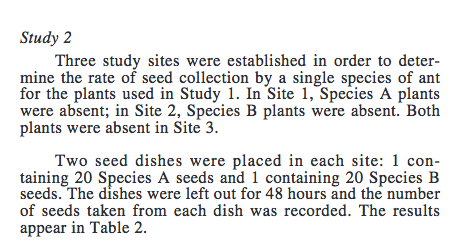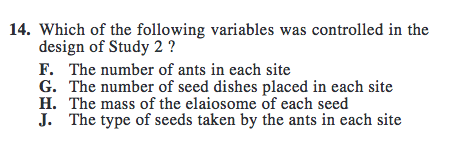Rebecca Wang
Rebecca Wang
ACT 🎒
53 resourcesSee Units
Welcome aboard!🎉 Today, we're delving into the essential topic of ACT Scientific Investigation, a crucial aspect of the ACT Science exam. So, are you ready to enhance your investigative skills and conquer the ACT Science? Let's dive in and embark on this journey together!
🧪 ACT Scientific Investigation: Concepts to Know
Reading Graphs and Tables: The passages often include graphs, charts, and tables that present data. Understand how to read and interpret different types of graphs, such as line graphs, bar graphs, scatter plots, and pie charts.
Experimental Design: Be familiar with the basic components of a scientific experiment, such as the hypothesis, variables (independent and dependent), control groups, and experimental groups.
Variables: Understand the distinction between independent variables (the ones being manipulated) and dependent variables (the ones being measured or observed). Also, be aware of constants, which are factors that remain unchanged throughout the experiment.
Experimental Errors and Bias: Recognize potential sources of error in experiments and how they may affect the results and conclusions. Understand the concept of bias and its impact on the validity of scientific investigations.
🤓 Tips for Success
1. Prioritize graphs and figures
In some questions, the text may not be necessary to answer. Prioritize reviewing graphs and figures as they often provide direct answers.
2. Practice regularly
Consistent practice is key to improving your skills. Work on a variety of scientific passages and questions to become familiar with different formats and concepts.
3. Read passages strategically
Before diving into questions, quickly skim the passage to get an overview of the topic and the data presented. Note any significant figures, trends, or experimental setups.
🔍 Types of Questions
Ready to test your skills? Let's jump into some ACT-style practice questions! 💪 Remember, it's not just about picking the right answer but understanding why it's correct. So, take a deep breath, and let's dive in! 🚀
Practice Question 1


There's a lot of scientific jargon about ants and elaiosomes that we do not need to know. Focus on what a controlled variable is. A controlled variable is a variable that remains constant. Reading the study description, we see that "Two seed dishes were placed in each site."
Correct Answer: G.
Practice Question 2

Based on the results of experiment 3, if the pressure of a gas is doubled and the volume and amount of the gas in the cylinder is held constant, what will be the impact on temperature?
A. It will stay the same.
B. It will double.
C. It will be halved.
D. It will be quadrupled.
Correct Answer: B. From table 3, it can be seen that as the temperature increases, the pressure increases. Since temperature is directly proportional to pressure (P/T = 3), it can be inferred that doubling the pressure of the gas will lead to a doubling of its temperature.
Practice Question 3

What is the dependent variable in the experiment above?
A. The number of days the bacteria grew.
B. The nutrient agar.
C. The nutrient agar with the oil.
D. The amount of growth of the bacteria.
Correct Answer: D. The dependent variable is always what occurs in response to the independent variable. In this case, the amount of growth displayed is the response.
📌 Conclusion
TLDR: With consistent practice and attention to detail, you're sure to shine in the ACT Science section!
Congratulations! 🎉 You've successfully completed the Scientific Investigation study guide for the ACT Science. Armed with a solid understanding, you're now well-prepared to tackle any investigation-related challenges in the exam. Remember to use your skills thoughtfully and precisely, as it plays a crucial role in interpreting experiments. Good luck on your journey to scientific investigation mastery! 🎓
Browse Study Guides By Unit
📚Reading
📝English
🔢Math
✒️Writing
✏️Frequently Asked Questions

© 2024 Fiveable Inc. All rights reserved.